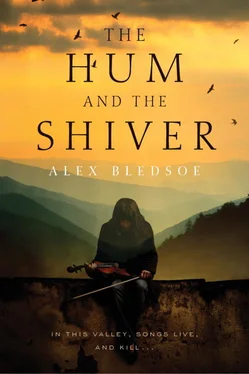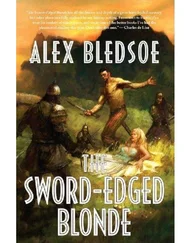The next talking head was Cole Kincaid, Democratic representative from Tennessee. “It appears that this young woman was in the process of being turned over to the Red Cross for transport back to the U.S. Command when the marines attacked. The doctor making the arrangements was killed, some say execution-style, by American troops. I’m determined to get to the bottom of this, no matter how high it goes.”
“Wow,” Aiden said. “Sounds like they don’t believe she’s a hero.”
“To them she’s not a real person,” Kell said. “She’s just a face they can exploit.”
“What does ‘exploit’ mean? Is it like ‘explode’?”
Kell smiled. “No, it means they’ll use her to make themselves look better.”
The newscaster returned. “There has been no public statement from Private Hyatt since she returned home a week ago to great fanfare.” Footage of the parade appeared. “The army has said she will be honorably discharged, and wishes to return to private life. But the question remains: Was this young woman a hero, a victim, or simply in the right place at the wrong time?”
Kell took the remote from Aiden and turned off the TV. “That’s enough of that.”
Aiden rolled his eyes and sighed. “Now what do we do, then? If I tell Mom I’m bored, she’ll just give me chores.”
“Can’t have that,” Kell agreed. He pretended to think hard. “Let’s get our squirrel guns and go pop some beer cans.”
“Cool!” Aiden cried, and jumped to his feet. As he rummaged through his closet, Kell opened Bronwyn’s door and peeked inside. His sister was asleep on her back, one strand of black hair curling along her cheek. He heard her soft snoring. He made a hand gesture that urged her to continue to rest as long as possible, then quietly closed the door.
Don Swayback was alone in the Weekly Horn office. Before he left for the day, Sam had congratulated him on speaking with the Hyatts, then reminded him that it wasn’t the same as doing the interview, which he still expected this week. Then he told Don to finish up the obituaries before heading out. That wasn’t hard, just tedious, and the sepulchral tones of the area’s undertakers always got on his nerves. When would these ghouls get e-mail?
He was about to dial the next one on his list when the front door opened, sending a shaft of hot afternoon sun into the room. A figure stood silhouetted in it, and Don said, “Come on in, you’re letting out what little air-conditioning we’ve got.”
The figure stepped forward and the door closed behind him. He was a heavyset young man with unruly blond hair and a prominent fat roll under his chin. He wore baggy shorts and a T-shirt that showed Uncle Sam urinating, Calvin-like, on the United Nations symbol. He clutched a thin MacBook Air to his chest.
When his eyes finally adjusted and he saw Don, he said, “Hi. Are you the editor?”
“No,” Don said as he stood. “I’m the staff. The editor’s gone for the day. Can I help you?”
The man looked behind him out the door as if he thought he might be followed. Then he scurried over to Don’s desk and sat in the chair opposite it. He looked Don over with uncomfortable scrutiny, paying special attention to his black hair. “Are you,” he asked finally, “one of them ?”
Don said nothing for a moment. “Define ‘them,’ and maybe I can tell you.”
“The Tufa People.”
“Oh. Yeah, I’ve got a little in me. But everyone around here does, pretty much. Why?”
The young man extended his right hand. “I’m Fred Blasco, the blogger. Fred, White, and Blue, you know? Twenty thousand unique hits a day? Linked to Drudge at least once a week? Anyway, I’m here because I wanted to corroborate some of my online findings by doing some fieldwork. I drove all the way from Atlanta to see Needsville, the home of the Tufa People.”
Don looked around for any reason to avoid this conversation. The empty office gave him nothing. “This is Unicorn, not Needsville. If you need directions, I’ll be happy to—”
“No, I got those from Yahoo,” Blasco said. “What I want to know is if you, the local media, know who’s living in your own backyard. Or should I say, what is living there.”
Blasco’s excitement had made him sweat, and the odor began to permeate the space. Don grew nervous. “Look, I don’t know what you mean, and I’m really kind of—”
“Okay, look, just give me a minute to catch you up. I’ve been following the Bronwyn Hyatt story ever since her rescue. The bluebellies—liberals, Democrats, blue states, get it?—are out there jumping through hoops to make her look like less than a hero. And as far as I can tell, she hasn’t said word one in her own defense. I wanted to know more about her, so I found out she was one of these Tufa People, and I started looking into that. Do you know about them?”
“Just what everyone around here knows.”
“Do you know they were already here when the first white people arrived in this area?”
“Yes.”
“Do you know that there are reliable accounts of some of them living two and three hundred years?”
Don blinked. “I never heard that, and I’ve lived here all my life. And, since I also do the obituaries, I can assure you plenty of the Tufa die much younger than that. I think someone might be yanking your chain. Where did you get your information?”
“Never mind. And here’s more for you. Did you know that some people say they can fly?”
Don laughed before he knew he’d done it. “Fly?”
“Mock if you want, but I’ve talked to a lot of people over the Internet. They say that when the Tufa People meet for their secret ceremonies, they grow wings and can fly. They say it happens because the Tufa People are actually the remnants of the Tuatha, the original fairy folk who left England and Ireland centuries before any settlers came to the New World.”
Don just stared. “I just want to be sure I’m following this, Fred. You say the Tufa… the people living over in Needsville, Tennessee, as we speak… are actually a lost tribe of Irish fairies?”
“I know how it sounds, believe me. That’s why I had to come up here and see for myself. But look, let me show you something.”
He opened the laptop on the edge of Don’s desk and spent a moment typing. “My mom got me this Air for my birthday, it’s so cool,” he murmured, as if Don were his best friend.
“We don’t have wireless,” Don pointed out.
“That’s okay, this is a file. Now look.” He turned the laptop so Don could see the screen.
It displayed a satellite shot of rural countryside. The trees were clear, and at one edge a paved road cut across the corner. But along the far left side were two white silhouettes. Don had to admit they did look like the traditional image of fairies: humanoid forms with large butterfly-like wings, apparently moving fast enough to cause a blur.
“See?” Blasco said excitedly. “This is a Google image filtered through enhancement freeware. Those are fairies, man. In flight over Cloud County, Tennessee. For real. ”
Don looked at the nondescript countryside. “That could be anywhere.”
“I trust my source.”
“And those could be just a couple of bugs close to the lens.”
Blasco looked at him. “Of a satellite ?”
Don’s wariness now mixed with amusement. Whatever the origins of the Tufa might be, he was certain they were flesh-and-blood people. “Fred, look. I’m serious here. I have lived in this area all my life, and this is the first I’ve ever heard of this. My own great-grandmother was a full-blooded Tufa, and she never sprouted wings and fluttered off. Wherever you’re getting this, my advice would be to check your sources a little more closely before you make yourself look foolish.”
Читать дальше












